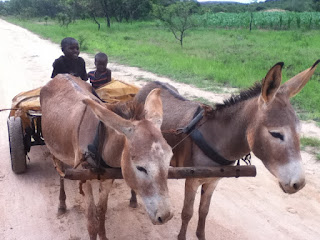Left Christmas Eve day for Marondera, about an hour east of Harare, to visit Musekiwa Chingodza. (Musekiwa has come to Vancouver Island a few times now, and will be with us again this coming summer at Nhemamusasa North)
We spent a few days hanging in the Chipinda hi-density district of Marondera.
Mhofu (antelope - Musekiwa's totem) wanted to go to his father's home to consult before he leaves for his trip to North America in February. We caught a lift north.
Mhofu's father farms a piece of land at the base of a small hill covered in kopjes (rock formations common in much of Zimbabwe).
Many of the rocks have bushmen paintings from the period before the current bantu population migrated into the area.
Tuning the mbiras that stay in the dare, where ceremonies take place. Mhofu's father has two spirits, and people come from all over to consult with them.
The dare. The smaller building to the right is a ganary, where grain is kept for the spirits, which is then used to brew seven-day beer for ceremonies.
Mhofu's father's place -- right of the photo is the new house they are building.
From Musekiwa's father's place we walked a couple km's across the hill to catch a lift to Chigogodza, the closest drop-off to walk to his kumusha (rural home). It's a 7km walk from there.
Nyagambe River bridge.
Mhofu's kumusha. His brother Crispin and oldest son Tinashe have been staying here. Tinashe is going to be starting Form 1 in Marondera this month.
Inside the kitchen hut..... most kitchens have a cooking hearth in the middle, and built in adobe shelving, as well as a built in bench along one side where the men sit.
Hanging with Tadiwa, Mhofu's third-born. His fourth-born Tanatswa was born three days before I arrived.
And then back to the city life for three days of errands. This is in downtown Harare, unusually quiet on New Year's day. Kariga Mombe is a centuries old song from the mbira, the first song most mbira players learn, and means 'to take down the bull', i.e. tackle your problems head-on.























